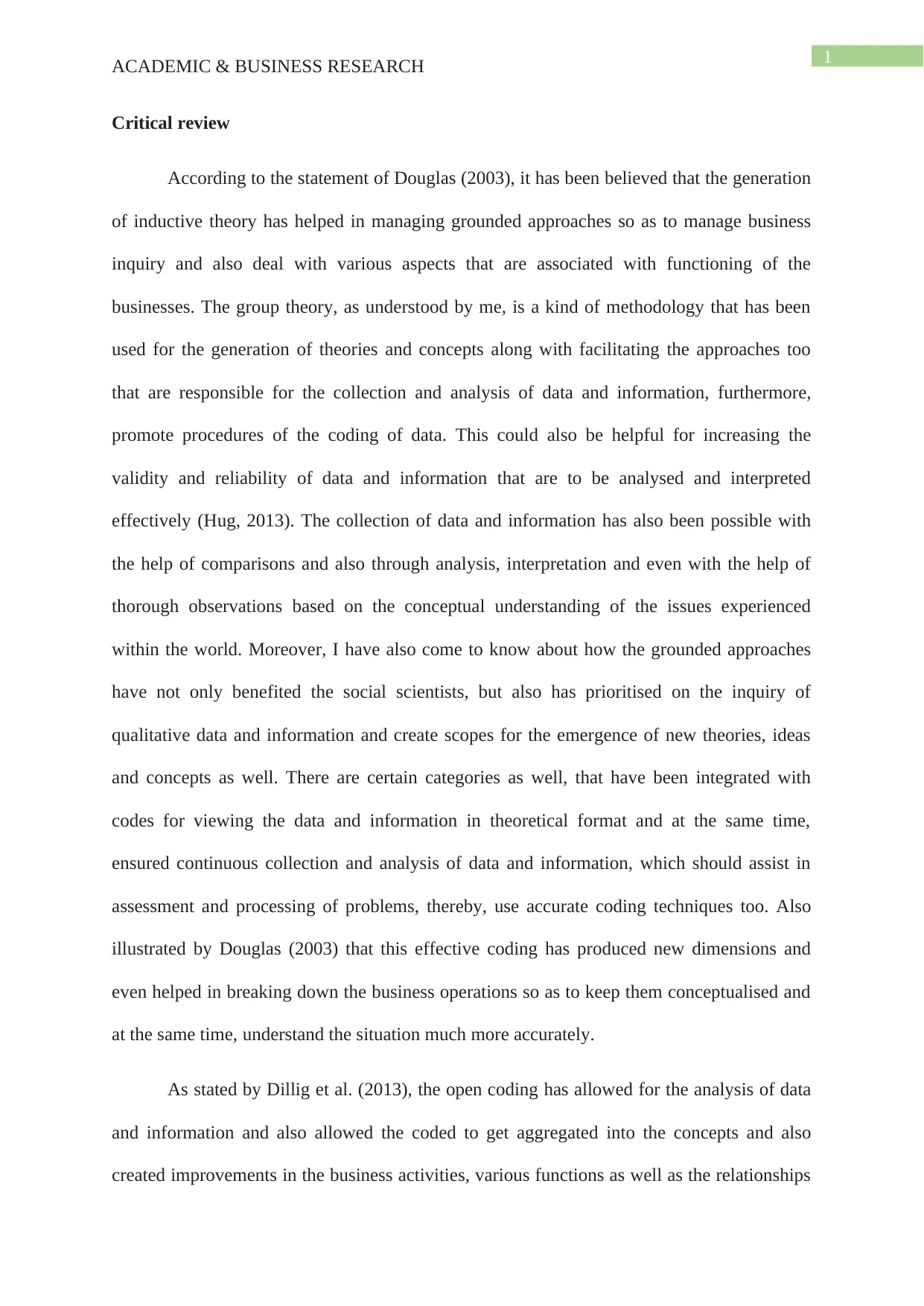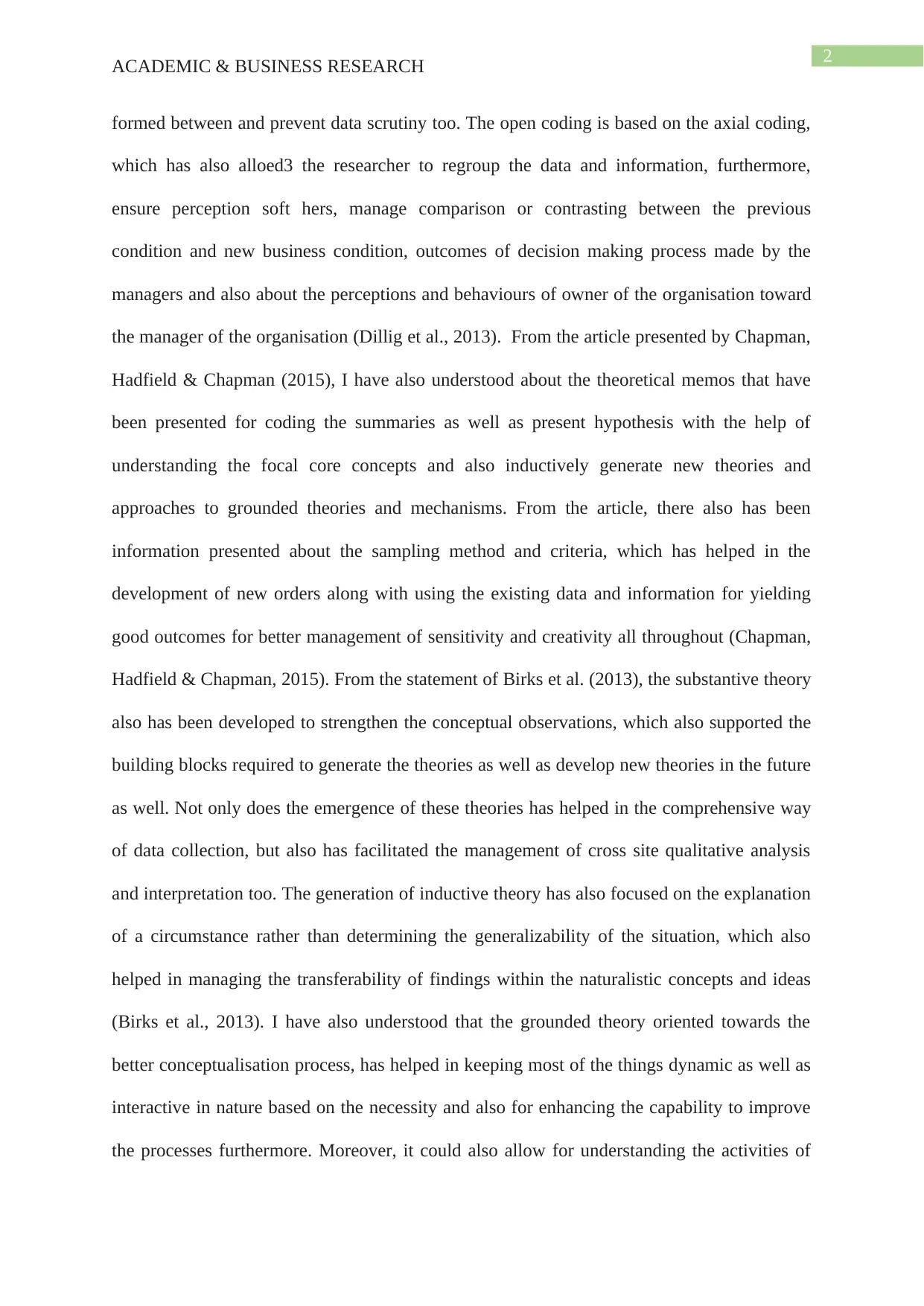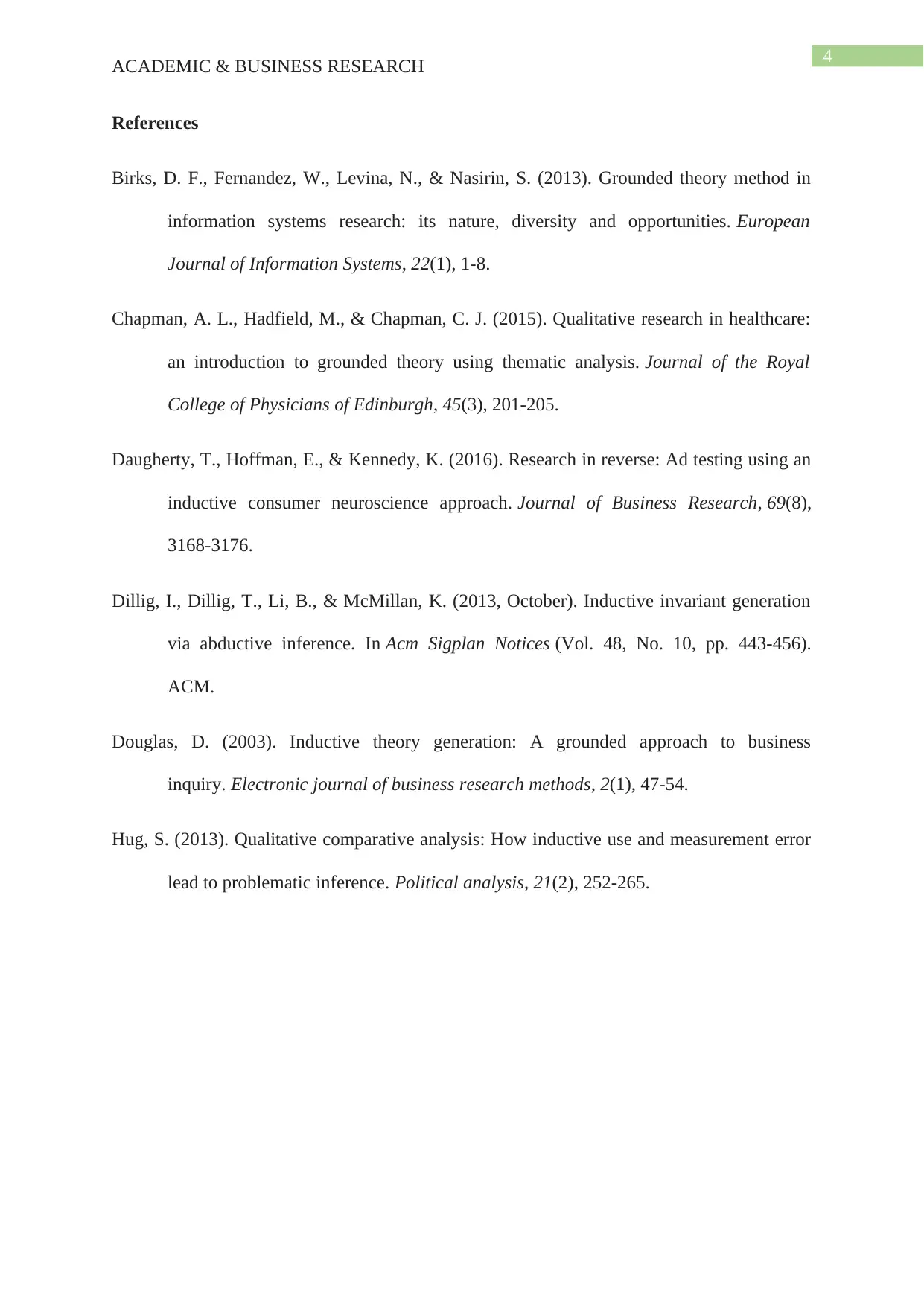University Research: Critical Analysis of Academic & Business Research
VerifiedAdded on 2022/08/31
|5
|1112
|18
Report
AI Summary
This report provides a critical review of academic and business research, focusing on the application of grounded theory. The report explores the methodology of grounded theory, emphasizing its inductive approach to theory generation and its use in business inquiry. It discusses the importance of data collection, coding techniques (open and axial), and analysis for developing substantive theories. The review highlights how grounded theory has been used to understand various aspects of business operations, including customer service, employee perceptions, and decision-making processes. Furthermore, the report references several academic articles to support the understanding of the methodology and its applications in business research. The analysis also covers the benefits of grounded theory in understanding the dynamic nature of business environments, and the ability to develop new theories. The report concludes by emphasizing the utility of grounded theory in facilitating a deeper understanding of business phenomena and generating knowledge.

Running head: ACADEMIC & BUSINESS RESEARCH
Academic & Business Research
Name of student
Name of University
Author note
Academic & Business Research
Name of student
Name of University
Author note
Paraphrase This Document
Need a fresh take? Get an instant paraphrase of this document with our AI Paraphraser

1
ACADEMIC & BUSINESS RESEARCH
Critical review
According to the statement of Douglas (2003), it has been believed that the generation
of inductive theory has helped in managing grounded approaches so as to manage business
inquiry and also deal with various aspects that are associated with functioning of the
businesses. The group theory, as understood by me, is a kind of methodology that has been
used for the generation of theories and concepts along with facilitating the approaches too
that are responsible for the collection and analysis of data and information, furthermore,
promote procedures of the coding of data. This could also be helpful for increasing the
validity and reliability of data and information that are to be analysed and interpreted
effectively (Hug, 2013). The collection of data and information has also been possible with
the help of comparisons and also through analysis, interpretation and even with the help of
thorough observations based on the conceptual understanding of the issues experienced
within the world. Moreover, I have also come to know about how the grounded approaches
have not only benefited the social scientists, but also has prioritised on the inquiry of
qualitative data and information and create scopes for the emergence of new theories, ideas
and concepts as well. There are certain categories as well, that have been integrated with
codes for viewing the data and information in theoretical format and at the same time,
ensured continuous collection and analysis of data and information, which should assist in
assessment and processing of problems, thereby, use accurate coding techniques too. Also
illustrated by Douglas (2003) that this effective coding has produced new dimensions and
even helped in breaking down the business operations so as to keep them conceptualised and
at the same time, understand the situation much more accurately.
As stated by Dillig et al. (2013), the open coding has allowed for the analysis of data
and information and also allowed the coded to get aggregated into the concepts and also
created improvements in the business activities, various functions as well as the relationships
ACADEMIC & BUSINESS RESEARCH
Critical review
According to the statement of Douglas (2003), it has been believed that the generation
of inductive theory has helped in managing grounded approaches so as to manage business
inquiry and also deal with various aspects that are associated with functioning of the
businesses. The group theory, as understood by me, is a kind of methodology that has been
used for the generation of theories and concepts along with facilitating the approaches too
that are responsible for the collection and analysis of data and information, furthermore,
promote procedures of the coding of data. This could also be helpful for increasing the
validity and reliability of data and information that are to be analysed and interpreted
effectively (Hug, 2013). The collection of data and information has also been possible with
the help of comparisons and also through analysis, interpretation and even with the help of
thorough observations based on the conceptual understanding of the issues experienced
within the world. Moreover, I have also come to know about how the grounded approaches
have not only benefited the social scientists, but also has prioritised on the inquiry of
qualitative data and information and create scopes for the emergence of new theories, ideas
and concepts as well. There are certain categories as well, that have been integrated with
codes for viewing the data and information in theoretical format and at the same time,
ensured continuous collection and analysis of data and information, which should assist in
assessment and processing of problems, thereby, use accurate coding techniques too. Also
illustrated by Douglas (2003) that this effective coding has produced new dimensions and
even helped in breaking down the business operations so as to keep them conceptualised and
at the same time, understand the situation much more accurately.
As stated by Dillig et al. (2013), the open coding has allowed for the analysis of data
and information and also allowed the coded to get aggregated into the concepts and also
created improvements in the business activities, various functions as well as the relationships

2
ACADEMIC & BUSINESS RESEARCH
formed between and prevent data scrutiny too. The open coding is based on the axial coding,
which has also alloed3 the researcher to regroup the data and information, furthermore,
ensure perception soft hers, manage comparison or contrasting between the previous
condition and new business condition, outcomes of decision making process made by the
managers and also about the perceptions and behaviours of owner of the organisation toward
the manager of the organisation (Dillig et al., 2013). From the article presented by Chapman,
Hadfield & Chapman (2015), I have also understood about the theoretical memos that have
been presented for coding the summaries as well as present hypothesis with the help of
understanding the focal core concepts and also inductively generate new theories and
approaches to grounded theories and mechanisms. From the article, there also has been
information presented about the sampling method and criteria, which has helped in the
development of new orders along with using the existing data and information for yielding
good outcomes for better management of sensitivity and creativity all throughout (Chapman,
Hadfield & Chapman, 2015). From the statement of Birks et al. (2013), the substantive theory
also has been developed to strengthen the conceptual observations, which also supported the
building blocks required to generate the theories as well as develop new theories in the future
as well. Not only does the emergence of these theories has helped in the comprehensive way
of data collection, but also has facilitated the management of cross site qualitative analysis
and interpretation too. The generation of inductive theory has also focused on the explanation
of a circumstance rather than determining the generalizability of the situation, which also
helped in managing the transferability of findings within the naturalistic concepts and ideas
(Birks et al., 2013). I have also understood that the grounded theory oriented towards the
better conceptualisation process, has helped in keeping most of the things dynamic as well as
interactive in nature based on the necessity and also for enhancing the capability to improve
the processes furthermore. Moreover, it could also allow for understanding the activities of
ACADEMIC & BUSINESS RESEARCH
formed between and prevent data scrutiny too. The open coding is based on the axial coding,
which has also alloed3 the researcher to regroup the data and information, furthermore,
ensure perception soft hers, manage comparison or contrasting between the previous
condition and new business condition, outcomes of decision making process made by the
managers and also about the perceptions and behaviours of owner of the organisation toward
the manager of the organisation (Dillig et al., 2013). From the article presented by Chapman,
Hadfield & Chapman (2015), I have also understood about the theoretical memos that have
been presented for coding the summaries as well as present hypothesis with the help of
understanding the focal core concepts and also inductively generate new theories and
approaches to grounded theories and mechanisms. From the article, there also has been
information presented about the sampling method and criteria, which has helped in the
development of new orders along with using the existing data and information for yielding
good outcomes for better management of sensitivity and creativity all throughout (Chapman,
Hadfield & Chapman, 2015). From the statement of Birks et al. (2013), the substantive theory
also has been developed to strengthen the conceptual observations, which also supported the
building blocks required to generate the theories as well as develop new theories in the future
as well. Not only does the emergence of these theories has helped in the comprehensive way
of data collection, but also has facilitated the management of cross site qualitative analysis
and interpretation too. The generation of inductive theory has also focused on the explanation
of a circumstance rather than determining the generalizability of the situation, which also
helped in managing the transferability of findings within the naturalistic concepts and ideas
(Birks et al., 2013). I have also understood that the grounded theory oriented towards the
better conceptualisation process, has helped in keeping most of the things dynamic as well as
interactive in nature based on the necessity and also for enhancing the capability to improve
the processes furthermore. Moreover, it could also allow for understanding the activities of
⊘ This is a preview!⊘
Do you want full access?
Subscribe today to unlock all pages.

Trusted by 1+ million students worldwide

3
ACADEMIC & BUSINESS RESEARCH
the respondents in forming constructive reality as well as produce the various effective
concepts that are related to the emergent theory too. All these aspects learned by me have
also been helpful for managing perceptions of different employees, manage effective decision
making process, influence employee behaviours and attitudes and understand the various
concepts on much more details that are required for the business (Daugherty, Hoffman &
Kennedy, 2016).
ACADEMIC & BUSINESS RESEARCH
the respondents in forming constructive reality as well as produce the various effective
concepts that are related to the emergent theory too. All these aspects learned by me have
also been helpful for managing perceptions of different employees, manage effective decision
making process, influence employee behaviours and attitudes and understand the various
concepts on much more details that are required for the business (Daugherty, Hoffman &
Kennedy, 2016).
Paraphrase This Document
Need a fresh take? Get an instant paraphrase of this document with our AI Paraphraser

4
ACADEMIC & BUSINESS RESEARCH
References
Birks, D. F., Fernandez, W., Levina, N., & Nasirin, S. (2013). Grounded theory method in
information systems research: its nature, diversity and opportunities. European
Journal of Information Systems, 22(1), 1-8.
Chapman, A. L., Hadfield, M., & Chapman, C. J. (2015). Qualitative research in healthcare:
an introduction to grounded theory using thematic analysis. Journal of the Royal
College of Physicians of Edinburgh, 45(3), 201-205.
Daugherty, T., Hoffman, E., & Kennedy, K. (2016). Research in reverse: Ad testing using an
inductive consumer neuroscience approach. Journal of Business Research, 69(8),
3168-3176.
Dillig, I., Dillig, T., Li, B., & McMillan, K. (2013, October). Inductive invariant generation
via abductive inference. In Acm Sigplan Notices (Vol. 48, No. 10, pp. 443-456).
ACM.
Douglas, D. (2003). Inductive theory generation: A grounded approach to business
inquiry. Electronic journal of business research methods, 2(1), 47-54.
Hug, S. (2013). Qualitative comparative analysis: How inductive use and measurement error
lead to problematic inference. Political analysis, 21(2), 252-265.
ACADEMIC & BUSINESS RESEARCH
References
Birks, D. F., Fernandez, W., Levina, N., & Nasirin, S. (2013). Grounded theory method in
information systems research: its nature, diversity and opportunities. European
Journal of Information Systems, 22(1), 1-8.
Chapman, A. L., Hadfield, M., & Chapman, C. J. (2015). Qualitative research in healthcare:
an introduction to grounded theory using thematic analysis. Journal of the Royal
College of Physicians of Edinburgh, 45(3), 201-205.
Daugherty, T., Hoffman, E., & Kennedy, K. (2016). Research in reverse: Ad testing using an
inductive consumer neuroscience approach. Journal of Business Research, 69(8),
3168-3176.
Dillig, I., Dillig, T., Li, B., & McMillan, K. (2013, October). Inductive invariant generation
via abductive inference. In Acm Sigplan Notices (Vol. 48, No. 10, pp. 443-456).
ACM.
Douglas, D. (2003). Inductive theory generation: A grounded approach to business
inquiry. Electronic journal of business research methods, 2(1), 47-54.
Hug, S. (2013). Qualitative comparative analysis: How inductive use and measurement error
lead to problematic inference. Political analysis, 21(2), 252-265.
1 out of 5
Related Documents
Your All-in-One AI-Powered Toolkit for Academic Success.
+13062052269
info@desklib.com
Available 24*7 on WhatsApp / Email
![[object Object]](/_next/static/media/star-bottom.7253800d.svg)
Unlock your academic potential
Copyright © 2020–2026 A2Z Services. All Rights Reserved. Developed and managed by ZUCOL.





